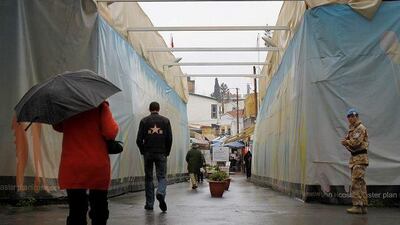NICOSIA // Ban Ki-moon, the UN secretary general, meets the leaders of the estranged Greek and Turkish Cypriot communities today, hoping to galvanise their sluggish talks to reunify the small but strategically located island. No one expects a swift breakthrough on the Cyprus problem. Mr Ban, however, may announce that the two leaders have achieved significant progress on one major issue: how to co-govern the island in a future peace deal.
Convergence on this "chapter" could encourage progress on others, say diplomats who are hoping for a peace deal this year. Mr Ban's high-profile presence in Cyprus is also intended as morale-boosting evidence of the international community's strong support for the 17-month-old peace process, whose outcome has ramifications well beyond Cyprus's shores. The island's 36-year-old division is damaging Turkey's European Union ambitions and hampering co-operation between the EU and Nato. It is also a source of friction between Nato members Greece and Turkey.
There were high hopes when the current UN-facilitated attempt to put Cyprus back together was launched in September 2008. For the first time in decades, there was a pro-settlement leader on both sides of the island's ceasefire line, which is manned by one of the oldest UN peacekeeping operations in the world. Demetris Christofias, the Greek Cypriot president who heads the island's internationally recognised administration, and Mehmet Ali Talat, who heads the Turkish Cypriot community, are pragmatic leftists and old trade union friends.
They have pledged to reunite the former British colony as a bi-zonal, bi-communal federation. Greece and Turkey, the respective "motherlands", have also committed themselves to help resolving the frozen conflict. There is now a sense of real urgency because this rare constellation of stars is in jeopardy. Looming over the talks are presidential elections on April 18 in the self-declared Turkish Cypriot state in northern Cyprus, which is recognised only by Ankara.
Mr Talat is trailing in the polls to Dervis Eroglu, a veteran right-wing politician who swept parliamentary elections last April. Mr Eroglu advocates a "two-state solution" that is unacceptable to the Greek Cypriots and contravenes the UN's 30-year push for a federal settlement. Mr Eroglu insists that if he wins, he will continue settlement talks with Mr Christofias. But it "would probably be a sterile process" where the two leaders meet "once a month for a coffee", said Hugh Pope, the Turkey-Cyprus director of the International Crisis Group.
If Mr Talat is ousted in April, "all bets are off" for a Cyprus settlement this year, most diplomats say, while warning that another opportunity might not arise for many more years. Until Mr Christofias and Mr Talat began negotiations last month, progress at their twice-weekly talks in the UN-controlled buffer zone in the divided capital of Nicosia was far slower than expected. Foreign envoys say Mr Ban may announce that the two leaders will hold one or two more rounds of intensive talks this month. It was believed the talks would be suspended this month to allow Mr Talat to campaign for re-election.
He and Mr Christofias face strong political pressure from their sceptical communities; media coverage of their endeavours has been mostly negative. Decades of repeated failure have bred disillusionment and cynicism among people on both sides of the divide. Polls show each community wants a settlement, but neither expects one. Alexander Downer, the UN special envoy for Cyprus, said on Friday that "significant progress has been made in a series of areas of governance".
A breakthrough on this issue, which is of major interest to the smaller Turkish Cypriot community, could bolster Mr Talat's chances of re-election, foreign envoys say. "Talat needs evidence that they've made substantial progress on at least one of the key chapters and that a settlement later this year is a real possibility if he remains in power," a senior European diplomat said. "Ban Ki-moon's visit is a boost for him. Talat can now argue that enough progress has been made to get the UN secretary general to visit Cyprus."
Many experts are pessimistic, however. "It will be a very significant achievement if they can settle the governance issue, but the most controversial chapters have not yet been touched - territory, guarantees and security," said Hubert Faustmann, a political analyst at the University of Nicosia. Cyprus, politically divided since 1963, was split along ethnic and religious lines in a Turkish invasion in 1974 triggered by a brief, Greek-inspired coup. Countless UN-brokered peace efforts have failed.
Mr Ban is the third UN secretary general to visit the island on a peace mission since 1972. The previous ones, by Kurt Waldheim and Kofi Annan, proved to be Sisyphean missions. Mr Talat's uphill struggle to remain in power dates to the last concerted peace effort, in 2004, which ended acrimoniously when Mr Christofias's hardline predecessor, Tassos Papadopoulos, led his people in rejecting a UN settlement plan that he deemed pro-Turkish and unworkable.
The less prosperous Turkish Cypriots, longing to end their isolation, endorsed the UN blueprint in a separate referendum. A week later, Cyprus, represented by the Greek Cypriots, entered the EU, with the Turkish Cypriots effectively left out in the cold. Mr Talat had championed the 2004 plan and held out the prospect that, in the event of failure, its endorsement by his community would be rewarded by the EU. Turkish Cypriots hoped for direct trade with the EU and direct flights, but the EU did not deliver, with Turkish Cypriots blaming Greek Cypriot obstructionism.
"If this latest deal fails, I think we'll all go into a long, slow slide into a deep freeze," Mr Pope said. "Everyone will wake up in 10 years' time and discover how much they've lost, but day-by-day no one will feel it." mtheodoulou@thenational.ae

